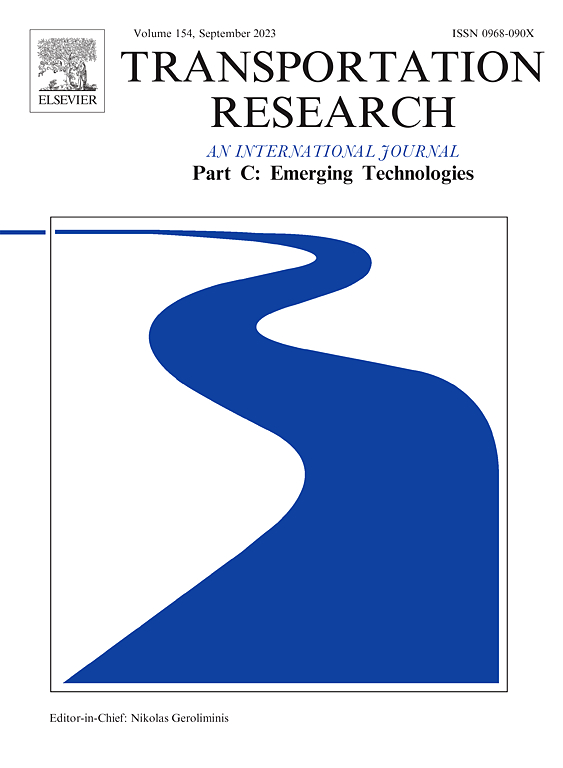多模式公共交通中个人出行行为个性化周期预测的多任务混合专家变压器
IF 7.6
1区 工程技术
Q1 TRANSPORTATION SCIENCE & TECHNOLOGY
Transportation Research Part C-Emerging Technologies
Pub Date : 2025-08-05
DOI:10.1016/j.trc.2025.105287
引用次数: 0
摘要
综合多式联运公共交通(PT)系统通过为个人用户提供个性化的出行体验,正在重塑城市交通。实现个性化出行的一个关键挑战是预测用户的周期性出行行为,以捕捉每个用户不断变化的出行偏好和模式。大数据和人工智能为准确预测个人出行行为提供了新的机会,这是有效规划个性化出行捆绑订阅和改善出行服务的关键第一步。本研究提出了一个新的框架PTBformer-MMoE,用于个性化的个人旅行行为的周期性预测,具体预测每个用户每月特定模式的旅行频率类别(分类任务)和每个用户每月预期的旅行费用(回归任务),使用用户最近的旅行记录。在多门混合专家(MMoE)框架中,每个专家网络由一个PTBformer实现,每个门确定与特定任务塔相关的专家输出的加权贡献。PTBformer集成了两个关键模块,即采用多特征自关注的多模变压器,用于连续时间序列旅行数据;和一个外径变压器捕捉外径特定的旅行特征与多外径自我关注。在2021年1月至2023年1月期间,对澳大利亚昆士兰州158万用户超过9.6亿次旅行记录的多模式(公共汽车、铁路、轮渡和电车)数据集进行了评估,与9个基线模型相比,提出的PTBformer-MMoE在预测每个用户每月特定模式的旅行频率类别和每月预期旅行费用方面表现出了最先进的性能,为个人旅行行为预测设定了新的基准。PTBformer-MMoE的预测能力展示了其在个性化移动订阅、定向推荐和优化需求管理等实际应用中的巨大潜力,最终为数据驱动和以用户为中心的多模式移动运输系统铺平了道路。本文章由计算机程序翻译,如有差异,请以英文原文为准。
A multi-task Transformer with mixture-of-experts for personalized periodic predictions of individual travel behavior in multimodal public transport
Integrated multimodal public transport (PT) systems are reshaping urban mobility by providing personalized travel experiences tailored to individual users. A critical challenge in realizing personalized mobility is predicting users’ periodic travel behaviors to capture each user’s evolving travel preferences and patterns. Big data and AI have opened new opportunities to accurately predict individual travel behavior, which is a critical initial step toward effective planning of personalized mobility bundle subscriptions and improvement of mobility services. This study proposes a novel framework, PTBformer-MMoE, for personalized periodic prediction of individual travel behavior, specifically predicting each user’s monthly mode-specific travel frequency class (classification tasks) and each user’s monthly expected travel fare (regression task), using the user’s most recent travel records. Within the multi-gate mixture-of-experts (MMoE) framework, each expert network is realized by a PTBformer, and each gate determines the weighted contributions of expert outputs relevant to a specific task tower. The PTBformer integrates two key modules, i.e., a Multi-mode Transformer employing multi-feature self-attention for continuous time-series travel data; and an OD Transformer capturing OD-specific travel features with multi-OD self-attention. Evaluated on a multimodal (bus, rail, ferry, and tram) dataset with over 0.96 billion travel records of 1.58 million users in Queensland, Australia, during 01/202101/2023, the proposed PTBformer-MMoE demonstrates state-of-the-art performance in predicting each user’s monthly mode-specific travel frequency class and monthly expected travel fare compared to 9 baseline models, setting a new benchmark for individual travel behavior predictions. The predictive capabilities of PTBformer-MMoE demonstrate its significant potential for real-world applications such as personalized mobility subscriptions, targeted recommendations, and optimized demand management, ultimately paving the way toward data-driven and user-centric multimodal PT systems.
求助全文
通过发布文献求助,成功后即可免费获取论文全文。
去求助
来源期刊
CiteScore
15.80
自引率
12.00%
发文量
332
审稿时长
64 days
期刊介绍:
Transportation Research: Part C (TR_C) is dedicated to showcasing high-quality, scholarly research that delves into the development, applications, and implications of transportation systems and emerging technologies. Our focus lies not solely on individual technologies, but rather on their broader implications for the planning, design, operation, control, maintenance, and rehabilitation of transportation systems, services, and components. In essence, the intellectual core of the journal revolves around the transportation aspect rather than the technology itself. We actively encourage the integration of quantitative methods from diverse fields such as operations research, control systems, complex networks, computer science, and artificial intelligence. Join us in exploring the intersection of transportation systems and emerging technologies to drive innovation and progress in the field.

 求助内容:
求助内容: 应助结果提醒方式:
应助结果提醒方式:


